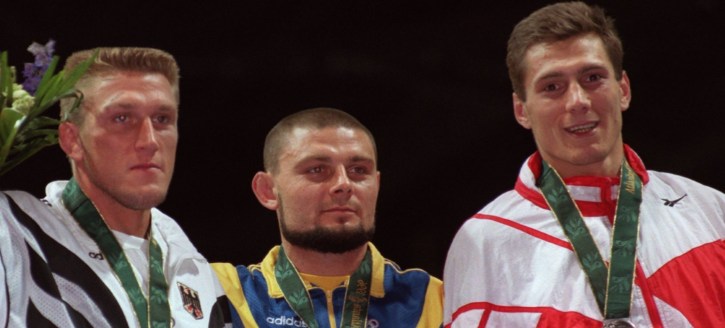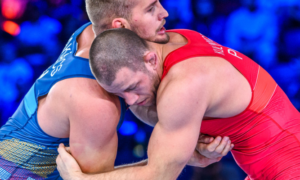You have to consider the circumstances. When Maik Bullmann first appeared on the Senior level in the late 1980’s, he was essentially jumping into an overcrowded shark tank. That particular era of Greco-Roman wrestling, which in many ways didn’t fully fade to black for over a decade, featured the most potent mix of upper-weights in the sport’s (modern Olympic) history.
The USSR had not yet dissolved; though that didn’t matter so much if only because the Soviets were deep enough in the heavier weights to send different athletes to the European Championships and Worlds each year…and still manage to replicate one astonishing result after another. Names sometimes changed. Results by and large didn’t.
But even after the USSR simply became known as the Russian Federation — and Georgia, Kazakhstan, Bulgaria, Armenia, Azerbaijan and every other former Soviet nation embraced their independence, leading to an influx of competitors — Bullmann remained at the top his game.
The same had already been proven true when the Berlin Wall came tumbling down. Bullmann, from the German Democratic Republic (East), was accustomed to challenges courtesy of athletes from the West. After the reunification of Germany in ’90, the train kept on rolling. Bullmann took over the top spot for the Federal Republic of Germany in short order — and held onto it until his retirement in ’00.
Such was his legacy. He was one of Greco’s finest wrestlers, an athletic marvel who devoted himself to technique but still carried more than enough meanness to bear down in the biggest moments competition has to offer.
But Bullmann, now 53 and an integral part of Germany’s National coaching staff, does not bask in memories of triumphs experienced long ago. Maybe he should. An Olympic Champion in ’92 and a World Champion three other times throughout a career that ended with seven medals in total speaks to his underappreciated — and undeniable greatness. An intense devotion to his craft was the key. For as naturally talented of a big man Bullmann might have been, he was, perhaps still is, recognized for the non-stop, never-ending commitment he had to be the best. The level of competition present demanded his fanaticism.
Between Soviet World beaters Vladimir Popov and Gogi Kouguashvili (who later went on to become the Russian National Team head coach) and a growing rash of antagonists from around the globe (including America’s Mike Foy early on), there was never time for Bullmann to settle in and take his status for granted. There were always carrots to chase. A succession of new and exciting ways to prove himself. Which he did, over and over again.
These days, Bullmann is in a similar situation to other full-time coaches. Germany is starting to gradually loosen its restrictions with regards to training. They’re hoping the pandemic is on its last legs in Europe, so the coach is trying to figure out how they are going to move forward. There is a lot on his plate. Bullmann mostly works with the age-groupers but it’s an(other) Olympic Year, and he just wants life to go back to normal. Like we all do.
On that note, the Hall of Fame athlete who enters into any “Greco’s Mount Rushmore” argument has had some availability recently, which he took to answer some questions about his career and the state of the sport during these temporary-but-tumultuous times.
5PM Interview with Maik Bullmann
5PM: If there is one thing the 1988 Olympics showed you, what was it? What was the most important thing you learned in Seoul?
Maik Bullmann: When I was 19, the 1988 Seoul Olympics were my first Games. I learned from this that the 82 kg weight class was not my weight class. I had to lose a lot of weight and was no longer able to perform. I achieved all my successes at 90 kilograms.
5PM: During the early part of your career, Russia was very deep in the upper-weights. There were plenty of guys. Did you consider the USSR to be your biggest on-the-mat rivals?
MB: Yes, the Soviet or Russian athletes were always my toughest opponents.
5PM: When you won your first World title in 1989, you pinned Mike Foy in the finals. You wrestled him several times. What do you remember most about Foy?
MB: I’ve fought with Mike Foy a lot. He was always a tough opponent. He was very big, strong, and technically, very good. He was also very willing to take risks.
5PM: Counting Barcelona, you won four straight gold medals from 1989-1992. You were still very young, barely even 25 years old. When you look back at that stretch of your career now, are the memories as vivid as if it all happened yesterday? Or does it feel like a lifetime ago?
MB: I like to remember that time, but it was a different phase of my life. Since I have now been working as a National coach for many years, the memory comes back temporarily. But it no longer determines my life.
5PM: Koguashvili, now the Russian coach, was also obviously a star competitor. When you see him nowadays at a tournament or camp, do you guys get along well?
Maik Bullmann: Koguashvili was my toughest opponent. We often see each other over the course of the year and get on very well. Unfortunately, he doesn’t speak German or English, and I don’t speak Russian. The communication is therefore quite difficult. But, we have a friendly relationship and have a birthday almost on the same day!
5PM: Who were your favorite athletes to compete against during your career?
MB: I didn’t have a favorite opponent. But I preferred to be opponents where it was not so exhausting (laughs).
5PM: What was your training like on a daily basis leading up to a tournament like the European Championships or the Worlds? Did you pay special attention to any specific techniques or positions? Diet?
MB: Thank God, I didn’t have to go on a diet. Of course, I trained a lot and hard before big championships. Mainly technically. I worked on my special techniques, like shoulder throwing and lifting.
5PM: Do you consider Barcelona to be the high point of your career?
MB: Yes, Barcelona was certainly a highlight in my career. But in Atlanta 1996, it was the hardest to win a medal.

Bullmann (left) went 6-1 at the ’96 Atlanta Olympics, falling short in his third match to eventual champ and familiar rival Vyatsheslav Oleynik(UKR, center). To earn his bronze, Bullmann had to defeat Hakki Basar (TUR) in his penultimate bout. The German had bested Basar prior to Atlanta, including the ’92 Barcelona final where Bullmann won gold. (Photo: Arne Dedert)
5PM: Do you think the Olympics overshadow the World Championships? The Olympic Games is the most prestigious tournament, but the World Championships have more competitors.
MB: For me, the World Championships were always more important. But the Olympic Games are only every four years, and are therefore more important in the media.
5PM: One of the criticisms about Greco lately is that there is not enough scoring. This is definitely true between 87 kilos and heavyweight now more than ever before. Part of that is the rules, and part of it is the athletes’ responsibility. You were a scorer. For a big athlete, you took risks, you attempted throws, takedowns. Why do you think today’s Greco wrestlers are not as aggressive on the feet? Is it talent level and development? Or is it just fear of risk?
Maik Bullmann: For one thing, I think that the rules were sometimes very bad. But the technical training of the athletes is, or was not sufficient. But most athletes are not willing to take risks, they are afraid of making a mistake. Too bad. But things have gotten better in recent years.
5PM: You are familiar with the USA program and our coaches and athletes. You know that in this country, Greco-Roman is the third style. First is scholastic folkstyle, second is freestyle for men and women, and third is Greco. From the outside looking in, do you see why this is considered to be a big problem in the US especially for development?
MB: Yes, I know a lot of the athletes and coaches in the USA. I’ve been to the US many times and know the training there. I personally believe that it is a little more difficult for Greco in the USA. Folkstyle at universities and freestyle are very popular. But — Greco has always managed to develop successful athletes. This shows that there are good coaches, and that coaching is always good in the USA. Even if Greco is not so successful at the moment, I am convinced that it will get better again. Everyone is doing this, it is up and down.
5PM: How early on do you and other German coaches identify talent in Cadet and Junior wrestlers? What is the biggest skill or attribute you take into consideration?
MB: At the age of 15, we join with the National Team program in Germany. That means we are preparing for European and Cadet World Championships. From this age onward, they are promoted to be with us. In the best case, they will then make the jump to Senior. The best qualities are hard work, technical training, and fun in the sport.
5PM: What is the most important aspect to training youth wrestlers so they do not burn out?
MB: Yes, you do have to be careful with young athletes. We try not to ask too much and develop it slowly. Quality comes before quantity. But we also leave a lot of room for academic and professional development.
5PM: What is the situation in Germany right now when it comes to the coronavirus and resuming wrestling practice again?
Maik Bullmann: At the moment, the situation is difficult for us, but also for other contact sports. Our athletes have not been able to get on the mat for almost three months. From this month, however, things are slowly moving towards mat training. In the past few months, we have only been able to train physical conditioning, strength and endurance.
5PM: Were you shocked by how quickly this took over the news, and that Tokyo was postponed for a year?
MB: Yes, I was very shocked by the news. All of our athletes were looking forward to it and prepared for it.
5PM: What is it about Denis Kudla that makes him so effective? Did you know he was going to be this good when he was younger and do you get the chance to work with him?
MB: I have worked with Denis Kudla from his 15th birthday until the beginning of his Senior career. Every year we won medals with the Cadets and Juniors at the European and World Championships. I was very sure that he would also be successful at Senior.
5PM: If you could take charge and make changes to fix Greco-Roman wrestling, what would be the first thing that you do?
Maik Bullmann: That is a very difficult question. Greco has certainly changed a bit to the positive, but it’s not yet perfect. Wrestling is a highly complex, technical, and beautiful sport. The technical fight and the willingness to take risks must be rewarded more. The first thing I would do would be to create a clear set of rules. At the moment, there are too many possibilities for the judges to give different judgments for an action. There are many other approaches.
Listen to “5PM37: The wildman Sammy Jones” on Spreaker.
SUBSCRIBE TO THE FIVE POINT MOVE PODCAST
iTunes | Stitcher | Spreaker | Google Play Music
















